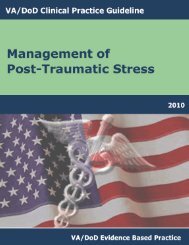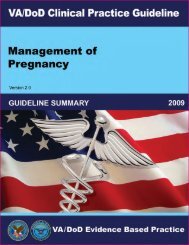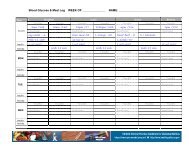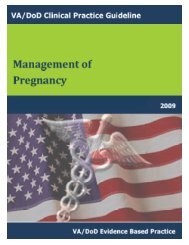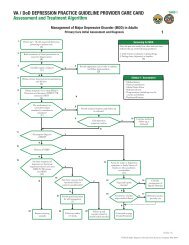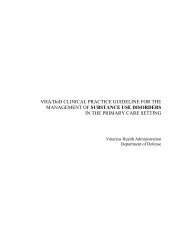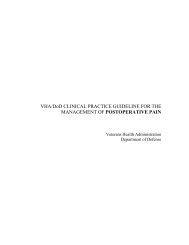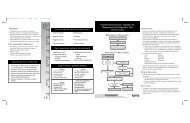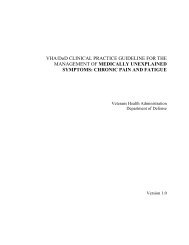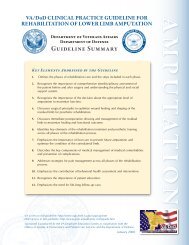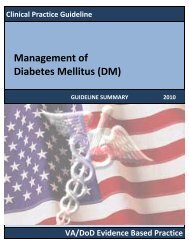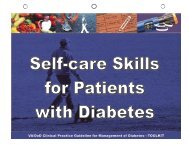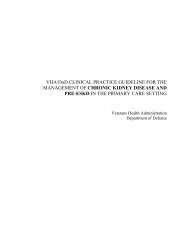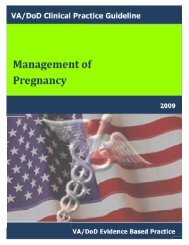DM Full Guideline (2010) - VA/DoD Clinical Practice Guidelines Home
DM Full Guideline (2010) - VA/DoD Clinical Practice Guidelines Home
DM Full Guideline (2010) - VA/DoD Clinical Practice Guidelines Home
You also want an ePaper? Increase the reach of your titles
YUMPU automatically turns print PDFs into web optimized ePapers that Google loves.
Version 4.0<br />
General principles to be reviewed are:<br />
BASIC DIET GUIDELINES<br />
• Eat at regular times—distribute CHO food intake throughout the day.<br />
• Define CHO, protein, and fat.<br />
• Describe which foods affect blood sugar the most (e.g., CHO).<br />
<strong>VA</strong>/<strong>DoD</strong> <strong>Clinical</strong> <strong>Practice</strong> <strong>Guideline</strong><br />
for the Management of Diabetes Mellitus<br />
• Emphasize the importance of eating a variety of foods, increasing fiber, and a hypocaloric diet—if<br />
overweight, e.g., decreasing fat intake and controlling portion sizes.<br />
• Sick day management<br />
• When to seek further medical assistance<br />
•<br />
Additional resources are available at:<br />
SPECIAL CIRCUMSTANCES<br />
• Take Charge Of Your Diabetes. Third edition. Can be downloaded from the CDC web site:<br />
http://www.cdc.gov/diabetes/pubs/tcyd/index.htm<br />
• What I Need To Know About Eating And Diabetes. Can be obtained free from the National Diabetes<br />
Clearing House (301) 654-3327 or at http://www.ndic@info.niddk.nih.gov/<br />
• www.ndep.nih.gov<br />
CORE COMPETENCIES AND DIABETES SELF-MANAGEMENT EDUCATION (DSME)<br />
Diabetes self-management education (DSME), including medical nutrition therapy, is an interactive, collaborative,<br />
ongoing process involving people with diabetes and educators. As opposed to didactic education, DSME is skillbased<br />
learning. The four-step process comprises:<br />
• Assessment of the individual’s educational needs<br />
• Identification of individual’s specific self-management goals<br />
• Education and behavioral interventions aimed at meeting individual’s goals<br />
• Evaluation of the individual’s progress towards goals<br />
The revised standards identify the following as essential curricula components for DSME:<br />
• Describing the diabetes disease process and treatment options<br />
• Incorporating appropriate nutritional management<br />
• Incorporating physical activity into lifestyle<br />
• Using medications (if applicable) for therapeutic effectiveness<br />
• Monitoring blood glucose, monitoring blood or urine ketones (when appropriate), and using the results to<br />
improve control<br />
• Preventing, detecting, and treating acute complications<br />
• Preventing (through risk-reduction behavior), detecting, and treating chronic complications<br />
• Goal setting to promote health; problem-solving for daily living<br />
• Integrating psychosocial adjustment into daily life<br />
• Promoting preconception care, management during pregnancy, and gestational diabetes management (if<br />
applicable)<br />
• Diabetes overview<br />
• Stress and psychological adjustment<br />
• Family involvement and social support<br />
• Nutrition<br />
Module M: Self-management Page 119



